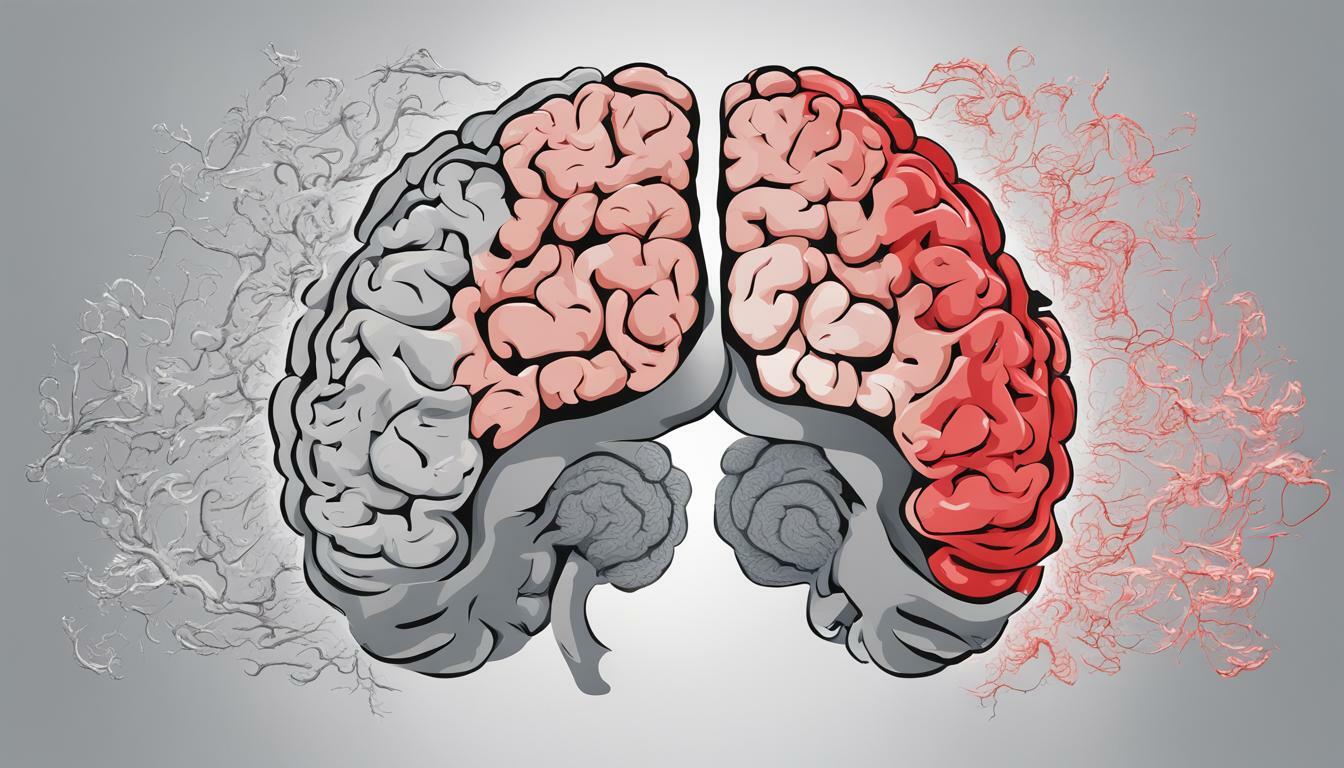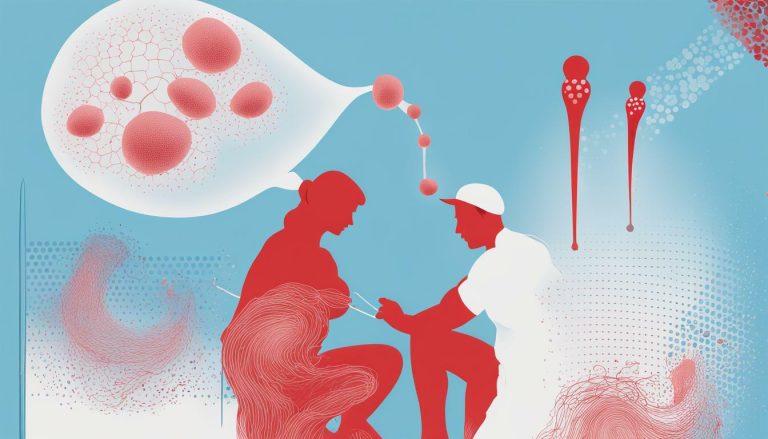Uncovering How Steroids Affect the Brain and Emotions
Steroids have become a common subject of discussion in the world of sports and fitness. However, little is known about the impact of these substances on the brain and emotions. Understanding the scientific links between steroid use and emotional health is crucial to ensure individuals are aware of the potential risks and side effects.
In this article, we will delve into the science behind steroids and the brain, explore emotional effects of steroid use, and discuss the risks and side effects of long-term use. We will also focus on the specific impact of anabolic steroids on the brain and emotions, highlighting the need for further research in this area.
Key Takeaways
- Steroid use can impact the brain and emotions in various ways.
- Anabolic steroids can lead to potential psychiatric symptoms.
- Long-term steroid use can have negative consequences, including addiction and cognitive impairment.
The Science Behind Steroids and the Brain
Steroids have been observed to have a significant impact on the brain and emotions. Scientists have identified that steroids interact with neural pathways and neurotransmitters to bring about changes in emotional behavior. This section aims to explore the science behind steroids and the brain and their impact on emotions.
The Role of Neurotransmitters
Neurotransmitters such as dopamine, norepinephrine, and serotonin play a crucial role in the functioning of the brain. Steroids have been found to affect neurotransmitters, leading to changes in mood and behavior. For example, studies have shown that steroids increase dopamine levels in the brain’s reward center, leading to increased aggression and risk-taking behavior.
Similarly, steroids have been found to decrease levels of serotonin, a neurotransmitter that regulates mood, leading to a higher likelihood of depression and anxiety. It is important to note that these changes in neurotransmitter levels are dose-dependent, and higher doses of steroids are more likely to cause significant changes in emotions and behavior.
The Hypothalamic-Pituitary-Adrenal (HPA) Axis
The HPA axis is a complex system that regulates the body’s response to stress. Steroids, specifically glucocorticoids, have been found to affect HPA axis functioning. Prolonged use of steroids can lead to a dysregulation of the HPA axis, leading to increased anxiety levels, decreased stress tolerance, and increased susceptibility to psychiatric disorders.
The Reward System
The reward system is a network of neural structures responsible for regulating motivation, reward, and reinforcement. Steroids have been found to activate the reward system, leading to a potential addiction to steroid use. Studies have also identified that prolonged steroid use can result in changes in the reward system, leading to a higher risk of addiction and other psychiatric disorders.
In conclusion, steroids have been found to significantly impact the brain and emotions. The mechanisms through which steroids interact with neurotransmitters, the HPA axis, and the reward system can lead to significant changes in emotional behavior. It is crucial to understand the science behind steroids and their impact on the brain to ensure the safe and responsible use of steroids.
Emotional Effects of Steroid Use
Steroids can have a significant impact on an individual’s emotional well-being, causing a range of changes in mood and behavior. Understanding the brain and emotional effects of steroids is crucial for individuals using these substances, as well as for medical professionals and researchers.
One of the most common emotional changes associated with steroid use is mood swings. These mood swings can range from manic highs to depressive lows, and can be unpredictable and intense. In some cases, individuals may experience periods of extreme irritability or aggression, known as “roid rage”.
Depression is another potential emotional side effect of steroid use. Research has shown that long-term steroid use can lead to changes in brain chemistry, including alterations to serotonin and dopamine levels, both of which play a crucial role in regulating mood.
Anxiety is also a common issue for individuals using steroids. This could be due to a number of factors, including the pressure to maintain a certain physique, as well as the physical side effects of steroid use, such as acne and weight gain.
In addition to these short-term effects, there are also potential long-term impacts on emotional well-being associated with steroid use. Studies have linked long-term steroid use with an increased risk of psychiatric disorders, including anxiety disorders, bipolar disorder, and psychotic disorders.
Steroids and Changes in Brain and Emotions
The emotional effects of steroids are largely due to changes in the brain caused by steroid use. Steroids impact on the brain and emotions, altering the balance of neurotransmitters such as serotonin and dopamine, which play a crucial role in regulating mood, appetite, and sleep.
Steroids also affect the hypothalamus and pituitary gland, which are responsible for regulating hormone production and releasing stress responses. Alterations in these systems can lead to imbalances in the body, potentially causing mood swings, anxiety, and depression.
It is important to note that not all individuals using steroids will experience emotional side effects. However, the potential risks and long-term impacts of steroid use on emotional well-being cannot be ignored.
Anabolic Steroids and the Brain
Anabolic steroids are synthetic substances that mimic the effects of testosterone in the body. While they have been used medically to treat a variety of conditions, they are most commonly associated with performance enhancement and bodybuilding.
The effects of anabolic steroids on the brain and emotions can be significant. High doses of anabolic steroids can lead to changes in neural pathways, neurotransmitters, and the reward system. These changes can result in potential psychiatric symptoms, including aggression, paranoia, and even psychosis.
How Anabolic Steroids Affect the Brain
Anabolic steroids interact with the brain’s reward system by increasing the activity of dopamine, a neurotransmitter associated with pleasure and reward. This can lead to feelings of euphoria and increased motivation.
However, over time, continual use of steroids can cause changes in the brain’s dopamine receptors, leading to decreased sensitivity and dependence on the drug for dopamine release. This can result in depression and other emotional disturbances.
Psychiatric Symptoms of Anabolic Steroid Use
Research has shown that the use of anabolic steroids can lead to a variety of psychiatric symptoms. These symptoms can range from mood swings and irritability to aggression and violence.
Long-term use of anabolic steroids can lead to more severe psychiatric disorders, such as mania and bipolar disorder. Additionally, there is evidence to suggest that prolonged steroid use may increase the risk of suicide.
Conclusion
The effects of anabolic steroids on the brain and emotions are complex and potentially serious. Individuals considering steroid use should be aware of the potential risks and side effects, including the impact on emotional well-being.
Further research is needed to fully understand the long-term effects of steroids on the brain and emotions. In the meantime, it is important to prioritize education and prevention efforts to minimize the negative consequences of steroid use.
Risks and Side Effects of Steroid Use
While steroids may provide short-term benefits in terms of physical performance, the impact of long-term steroid use on the brain and emotions can be severe.
One of the major risks associated with steroid use is addiction. The psychological dependence on steroids can lead to individuals continuing to use them despite negative consequences, such as mood swings and aggression. This can result in steroid-induced psychosis, a condition that may require hospitalization and can have lasting effects on a person’s mental health.
Steroid use can also result in cognitive impairment, particularly in the areas of attention and memory. This can be a significant risk factor for individuals who require cognitive function for their work, such as athletes or military personnel.
Psychiatric disorders are also a potential side effect of steroid use. Depression and anxiety are common among steroid users, and long-term use can result in irreversible changes in brain chemistry that may lead to bipolar disorder or schizophrenia.
The effects of steroids on the brain and emotions are not limited to negative consequences. Steroid use can also result in a reduction in stress and fatigue, leading to an increased sense of well-being and improved quality of life. However, these benefits are short-term and do not outweigh the long-term risks associated with steroid use.
In conclusion, while steroids may provide some short-term benefits, the risks associated with long-term steroid use on the brain and emotions cannot be ignored. It is essential to understand the impact of steroids on the brain and emotions and to seek professional help if experiencing negative mental health effects.
Conclusion
In conclusion, the impacts of steroids on the brain and emotions are complex and multifaceted. It is crucial to understand the mechanisms through which steroids interact with neural pathways and neurotransmitters, leading to changes in emotions and behavior. Common emotional changes experienced by individuals taking steroids include mood swings, aggression, and depression, and there may be potential long-term effects on emotional well-being.
Anabolic steroids, in particular, can have significant effects on the brain and emotions. High doses of anabolic steroids can impact neural pathways, neurotransmitters, and the reward system, leading to potential psychiatric symptoms.
It is also important to consider the risks and side effects of steroid use on the brain and emotions, such as addiction, cognitive impairment, and psychiatric disorders. Further research is needed in this area to fully understand the impacts of steroids on emotional and cognitive health.
Overall, the use of steroids should be approached with caution, and individuals should be aware of the potential impacts on their mental and emotional well-being.






